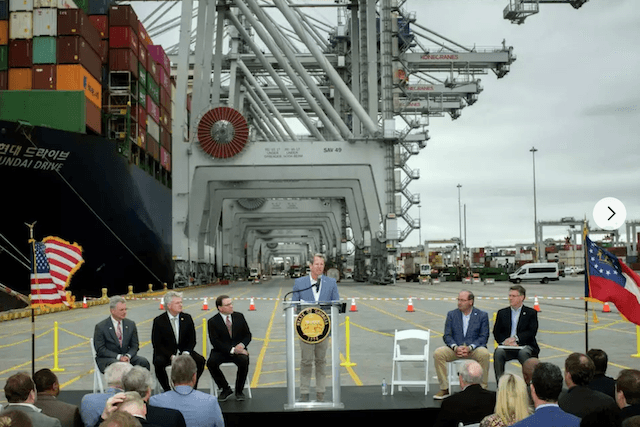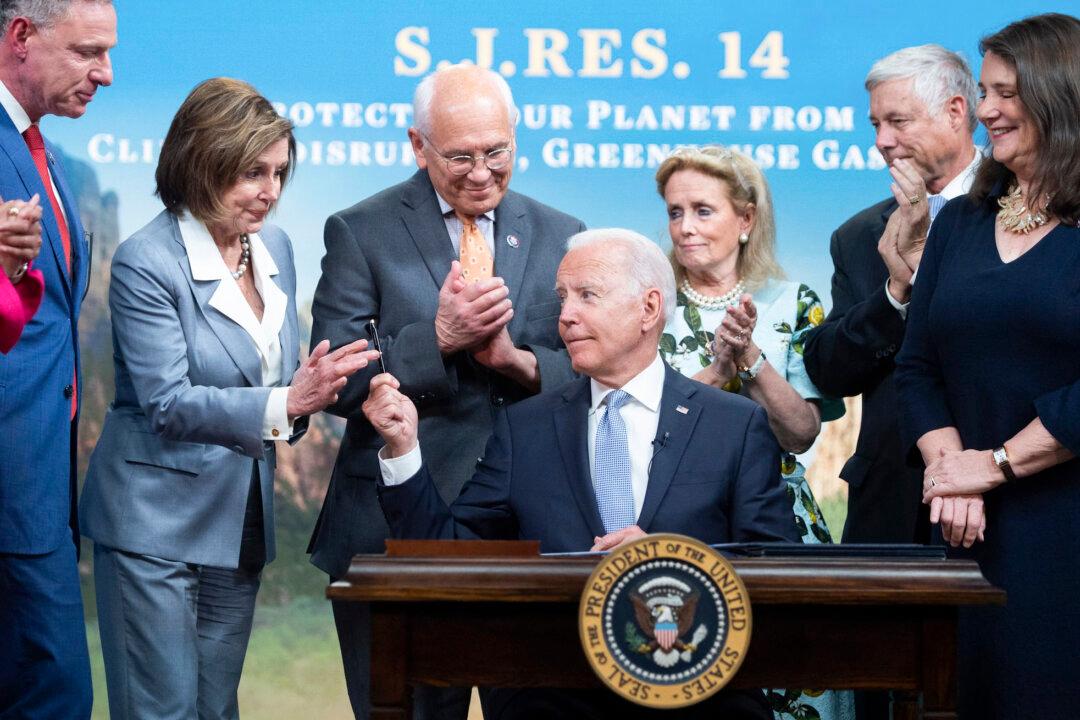Sorry to dredge it up again, but the lower Savannah River needs to be dredged up ... again.
Eighteen months after completing a 25-year, $973 million expansion that deepened its ship channel by 5 feet and two years to the day after Georgia Gov. Brian Kemp hailed the massive project as a “once-in-a-generation milestone,” time and tides threaten to make the bustling port a backwater in years to come.
Mr. Kemp and Georgia Port Authority officials made that new pitch for another Port of Savannah dredging project on March 25 to a Congressional delegation led by House Transportation & Infrastructure Committee Chair Rep. Sam Graves (R-Mo.) and urged on by Reps. Buddy Carter (R-Ga.) and Mike Collins (R-Ga.).
The Port of Savannah is not only a vital asset in “connecting Georgia-made goods to the entire world,” but to the nation’s economy, the governor said at the Georgia Port Authority’s Garden City Terminal as cranes unloaded ships in the background.
The Port of Savannah is the nation’s fourth-busiest container traffic port, handling the largest volume of imports/exports than any port in the Southeast and second only on the East Coast to the Port of New York/New Jersey.
“Congressman Graves,” Mr. Kemp said, “you probably hear a lot that we’re the number one state in the country for business 10 years in a row. The port is a big reason that we are.”
But the Port of Savannah could become a backwater in coming years unless the 40-mile Savannah River ship channel that links it with the sea is further deepened to accommodate the supersized container carriers now coming out of shipyards.
The 2014-22 dredging component of the massive port project deepened ship channels to 47 feet, which can accommodate ships of up to 8,200 twenty-foot equivalent units (TEUs).
But container carriers, many exceeding 16,000 TEUs, cannot get underneath the Eugene Talmadge Memorial Bridge that spans the river between the port and downtown Savannah at low tide, causing backlogs in getting dockside and delays that could force sea-transport operators to look for deeper waters.
Mr. Graves did not need much convincing that the project is needed.
“In a state like Missouri, we depend heavily on states like Georgia and ports like here in Savannah,” he said. “Without you all and without ports like this, we don’t get those things that we need.”
Mr. Graves said he will ensure there is money in the House’s Fiscal Year 2025 (FY25) Water Resources Development Bill to pay for a United States Army Corps of Engineers study to gauge the impacts of expanding and deepening the waterway.
He said the “further expansion of the port here in Savannah” is “a national priority.”
More than 5.4 million container units moved through the port in 2023, making it the leading cargo entry in the Southeast and a key asset in the nation’s import/export infrastructure.
The Georgia Port Authority estimates the port’s container traffic could swell beyond 7.6 million units annually by 2030 if it can handle larger ships without tidal restrictions.
As such, Mr. Graves said, “It’s a priority of mine to get this study done” because of its integration with rail and road, which makes it an ideal port to reach the fast-growing Southeast and points across the nation.
The Georgia Ports Authority agreed the lower Savannah River channel needed to be deepened last October and the state’s legislature during its 2024 session earmarked millions for port improvements.
In January, Mr. Carter and Sen. Raphael Warnock (D-Ga.) were the lead authors of a letter to two House and two Senate committees signed by Georgia’s entire congressional delegation urging lawmakers to commission the U.S. Army Corps of Engineers to study deepening the channels.
“Georgia’s ports are vital supply chain conduits and job creators for Georgia and the United States,” they wrote. “Due to how important the Port of Savannah is to the United States economy, it is critical to examine deepening and widening the existing project to ensure that the port can continue accommodating the ever-larger container vessels demanding access to these facilities.”
During his remarks to the congressional delegation, Mr. Kemp said the study and subsequent project is an investment in “momentum” to keep the state’s, the region’s, and the nation’s economy moving.
“When you come to this port and ride by all these ships, you don’t even have to sell it to anybody,” he said. “Just let them look and they can see how unbelievable it is.”
But time and tides wait for no man, and the big ships don’t have time to idle in tides.
“There’s no such thing as standing still,” Mr. Carter said. “If you’re not moving forward, you’re moving backward. We need to continue moving forward, that’s why we need this study so much.”







